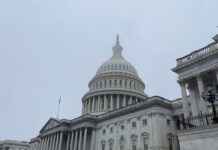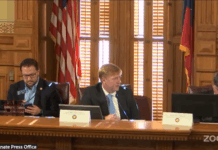
The Georgia Board of Regents, which oversees the state’s 26 public universities, voted Wednesday to make significant changes to tenure for college professors.
The changes will directly affect 7,500 tenured professors in Georgia. Some of them have been protesting in person at regents meetings and over social media, arguing the move could curtail academic freedom and encourage professors to seek work outside of the state.
Tenure is a status granted to some professors which grants them job protection. It is intended to preserve their academic freedom to pursue research that could raise hackles with administrators, politicians or donors.
But the regents said Georgia’s system had not been updated since its creation in 1996 and did not do enough to ensure professors were being held accountable for the quality of their work.
At committee hearings Tuesday, they sought to reassure professors that they had addressed their concerns, including worries that faculty would have no say in the rules and that professors accused of not meeting expectations could be let go without due process.
“We have added explicit language you can see in the item for review today, explicit language to make it clear that that is our intent that a shared faculty role will be part and parcel of the creation of this work, and of course, the appeal mechanisms will be part and parcel,” said the university system’s Executive Vice Chancellor for Academic Affairs and Chief Academic Officer Tristan Denley.
The American Association of University Professors has threatened to censure the University System of Georgia over the changes, according to Georgia chapter president Matthew Boedy.
According to the association’s website, it censures institutions where “conditions for academic freedom and tenure are unsatisfactory at a college or university.”
Public universities must soon begin updating their post-tenure review policies, which will spell out how tenured professors will be judged by their superiors. Under the new process, professors who score below the standard two years in a row could face consequences ranging from a pay cut to termination. The changes also specify that the regents have the power to take over the role of granting tenure from institutions that it determines are not rigorous enough in their reviews.
Cas Mudde, a professor of international affairs at the University of Georgia, said the move will put more pressure on researchers to avoid topics which could displease the people who donate to schools.
“As public financing of academia has plummeted in the last decades, universities (also public ones) have become more and more dependent upon private donors,” Mudde said in a tweet. “And financial dependence creates power inequalities, which threaten ‘problematic’ academics.”
In recent months, some conservative politicians have sought to put an end to the teaching of critical race theory in college classrooms.
In January, Gillsville Republican state Rep. Emory Dunahoo sent a letter to University System of Georgia administrators asking a series of questions including whether students are taught about the concepts of privilege and oppression, that some races are inherently privileged, or that white, male, heterosexual Christians are intrinsically oppressive.
Mudde said researchers in the hard sciences could be targeted for research that upsets the powerful as well, giving the example of those studying climate change.
The issue could become another political lightning rod as lawmakers look ahead to January when they will begin legislating ahead of a pivotal election.
Former Democratic gubernatorial candidate Stacey Abrams weighed in on Twitter, comparing the debate to the ongoing fight over COVID-19 protections on college campuses.
“Academic freedom guaranteed by tenure is more than a hiring gimmick,” she said. “Georgia cannot compete for talent or produce innovation if we undermine our public universities. @BORUSG has already abandoned the physical health of our schools. Let’s not destroy intellectual capacity as well.”






